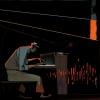
The ice wall between the concert hall and the movie theater has been thawing for years, thanks in large part to giants like John Williams who elevated the art form of film music and championed its inclusion in intelligent concerts. Just trace the 40-year line from his tenure as conductor of the Boston Pops to his recent invitations from august orchestras in Vienna and Berlin. Newer conductors at old-school institutions — like Gustavo Dudamel and Stéphane Denève — grew up with the symphonic music of the movies, to say nothing of the players who make up their orchestras, and are happy to program it (occasionally) alongside the classical canon.
But that’s only one side of the coin. The other is the emergence of nonclassical, or at least nontraditional, artists in both fields who flit between worlds and share mutual respect. Today’s amphibious composers include — among many — Bryce Dessner, Max Richter, Caroline Shaw, and Michael Abels. And in the past 15 years, several artists from outside the system have shaken up the Hollywood sound — “the system” here meaning everything from a classical path to composition to the field’s longtime predominance of white men.

The LA Phil is highlighting this major shift in a series of concerts aptly titled “Reel Change.” Across three consecutive nights beginning Friday, Nov. 19, three of today’s exciting younger film composers — Hildur Guðnadóttir, Kris Bowers, and Nicholas Britell — will present programs of their own music alongside pieces that inspired them.
Guðnadóttir won an Academy Award for her Joker score in 2020, becoming only the third woman in history to win that category. But her journey to the stage at Hollywood’s Dolby Theatre was far from the norm. Film and TV have only ever been part of a much broader universe of exploration for the Icelandic cellist, who came up in pop bands before joining a community of acoustoelectric alchemists in Berlin — among them the late Jóhann Jóhannsson.
For many years Hildur Guðnadóttir, 39, was performing live and making her own solo albums of dark, icy oceans while also performing cello on Jóhannsson’s scores for the increasingly notable films of director Denis Villeneuve: Prisoners, Sicario, and Arrival. Meanwhile she was scoring films and TV series on her own for mostly European productions, but around the time Jóhannsson died (in 2018) she was poised to catapult to Hollywood’s top echelon. She wrote a radioactive score for HBO’s Chernobyl, turning an old power plant into a living instrument, then made an outsized contribution to Joker — writing themes in advance of shooting, including one that star Joaquin Phoenix famously danced to on set in a pivotal moment of character transformation.
That amusingly titled but serious piece, “Bathroom Dance,” is one of Guðnadóttir’s own compositions featured in her Reel Change program. The others are a concert piece she wrote in 2013 for the Iceland Symphony, Under Takes Over, and new music from her first videogame, Battlefield 2042, co-written with her partner Sam Slater — which was recorded almost entirely with nonorchestral “instruments” including sampled glass and metal. This strange trio is emblematic of Guðnadóttir’s body of work and her general philosophy. “At the end of the day, it’s all music,” she says. “And I think we should both take music as seriously and as lightheartedly as possible.”
Her biggest musical influence is Alvin Lucier, the 90-year-old American experimentalist. Lucier’s Silver Streetcar for the Orchestra, performed entirely on a triangle, is included on her upcoming program.

“Everything I do is really rooted in listening, and listening with great intent, like listening with lots of curiosity,” she says. “A lot of my music sounds really simple, right, because I need a lot of time and space to be able to hear all the details and the textures of every sound, basically. So when things are being played really fast, and when there’s lots of stuff going on at the same time, I feel like I really miss out on the details that are happening within the molecules of each sound. And Alvin Lucier’s practice is really all about looking at the kind characteristics of space, characteristics of different objects. His music really alters our perception of what we think something sounds like, and it really expands your listening and your mind.”
Guðnadóttir’s program also includes pieces that inspired her and have some kind of tie to film. That includes Ryuichi Sakamoto’s theme for The Revenant and Mica Levi’s music for Under the Skin, as well as Kaija Saariaho’s Nymphéa Reflection: Feroce, an excerpt from Górecki’s Symphony No. 4, Arvo Pärt’s Fratres, and Ligeti’s Atmosphères — famously used in Stanley Kubrick’s 2001.

Nicholas Britell, the Oscar-nominated composer of Moonlight and If Beale Street Could Talk, is a poster child of film music’s unique place in popular culture right now. Thanks to his classical savvy and hip-hop bonafides, the 41-year-old New Yorker has written catchy hybrid music that has caught the attention of the lay viewer and attracted pop stars and rappers alike. His music is both elegant and hip, like the beat-driven minuets in the HBO hit Succession. Britell’s concert will feature selections of music he’s written for his two best customers, directors Adam McCay and Barry Jenkins — from the soured Americana of Vice to the melancholic jazz of Beale Street, up to the wet ink of his latest score for McCay’s Don’t Look Up, a mashup of orchestra and big band featuring bass sax, toy piano, banjos, mandolins, and multiple celestas.
One of the big challenges, for both Britell and Guðnadóttir, is taking music that was conceived in a controlled recording studio, relying on sampled music and gadgets — and translating it for a live orchestra. “With recording,” Britell says, “you have so much control. With live performance, every hall is different, every performance is different. The mystery of performance is exciting. I have no idea what Don’t Look Up will sound like live.”
Kris Bowers’s work, in some ways, is the most traditional of the three — although he inevitably brings a fresh approach to the orchestra. As a Black kid from Los Angeles whose rigorous musical education focused on jazz piano, Bowers has always seen things from a different vantage point. Unlike the other curators, his program will feature the premiere of a new concert work — a horn concerto for LA Phil principal Andrew Bain. (The composer introduced a violin concerto at Walt Disney Concert Hall in 2019.)

But he brings a decidedly cinematic approach to the classic form. Bowers, 32, conceived his concerto by directing a fictional movie in his mind — down to building storyboards out of images from other films — about a hunter and a magical deer. Inspired by Greek myth, the horn’s roots in hunting, and Bowers’ new role as a father, it’s an unabashedly visual and emotional piece of narrative.
He’s also creating visuals to accompany the music, to clarify and delineate the themes and sections of the classical structure “because it always feels like those sections are very emotionally different in these pieces,” he says. “So if those emotions are accompanied by some sort of visual aid, will that also help us relate certain sections, emotionally, that are related musically?” Bowers says that writing these concertos has been like going to school, and he wants to help decode and demystify the language for his audience.
In addition to an “inspirations medley” comprising the music by other film composers — Ryuichi Sakamoto, Jason Moran, Shigeru Umebayashi, Owen Pallett, Björk, and Jon Brion — Bowers’s program will feature suites from four of his own scores. Further embracing the power of imagery with music, his wife — actor Briana Henry — created short films to go with each suite. Rather than just a series of clips from the movies, these are newly shot shorts with original poetry narrated by talent from the movies — Mahershala Ali for Green Book, Ava DuVernay for When They See Us — and inspired by the emotions that inspired the music in the first place.
“So much of my process with the score for any project is thinking about how these relationships and emotions and stories exist in the real world and in my own life,” says Bowers. “I can think about my own father and my relationship with my father, I can think about the idea of being a father — all those things can help me emotionally connect to something that’s there, and I can write a theme that is going to connect with the story.”
Embracing story and visuals and emotion — acknowledging a truly eclectic family of influences — bringing technology and a studio mentality into the concert hall — not really trying to fit the old mold of who gets to be a composer — these are some of the hallmarks of the modern film composer. The LA Phil is lucky to have them inside their house.





